
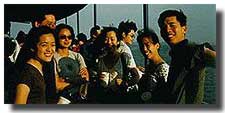 Saturday, September 20, 1997: TCSers accompany members of the Boston
Taiwanese American Association for a cruise around Boston Harbor.
Saturday, September 20, 1997: TCSers accompany members of the Boston
Taiwanese American Association for a cruise around Boston Harbor.
 Sunday, September 21, 1997: A dynasty is born. Led by Harvard Ultimate
team members Henry Hsieh and Eric Yeh, the TCS ultimate team takes to the field for
the first time, holding its inaugural practice at JFK Park. Henry and Eric are
joined by only a handful of TCSers including Yu-Han Chang, Grace Liu, Matt Feng
and Randy Wu in a
simple throw-around that afternoon, but are fully cognizant that out of humble
beginnings, greatness can arise.
Sunday, September 21, 1997: A dynasty is born. Led by Harvard Ultimate
team members Henry Hsieh and Eric Yeh, the TCS ultimate team takes to the field for
the first time, holding its inaugural practice at JFK Park. Henry and Eric are
joined by only a handful of TCSers including Yu-Han Chang, Grace Liu, Matt Feng
and Randy Wu in a
simple throw-around that afternoon, but are fully cognizant that out of humble
beginnings, greatness can arise.
October 8, 1997: Speculation begins about a possible visit by Chinese president Jiang Zemin to the Boston area and specifically the Harvard campus, in the first official state visit by a Chinese head of state since before the Tiananmen Square protests of 1989. The visit to Boston is part of a nation-wide tour of the United States by Jiang, also including stops in Washington, D.C., New York City, Los Angeles, California, and Williamsburg, Virginia.
 October 14-28, 1997: In the weeks leading up to Chinese president
Jiang Zemin's visit to Harvard, campus debate steadily rises, with controversy
swirling about any number of issues, from whether the Undergraduate Council should
pass a formal resolution to condemn Jiang's visit based on the human rights failings
of the regime he represents to what sort of response was appropriate from organizations
(such as the Chinese Students Association and Taiwanese Cultural Society in particular)
seen as having a personal yet politically-ambiguous interest in his visit.
October 14-28, 1997: In the weeks leading up to Chinese president
Jiang Zemin's visit to Harvard, campus debate steadily rises, with controversy
swirling about any number of issues, from whether the Undergraduate Council should
pass a formal resolution to condemn Jiang's visit based on the human rights failings
of the regime he represents to what sort of response was appropriate from organizations
(such as the Chinese Students Association and Taiwanese Cultural Society in particular)
seen as having a personal yet politically-ambiguous interest in his visit.
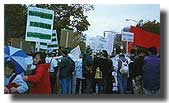 Friday, October 17, 1997: TCSers become aware that Boston area Taiwanese
groups including the Harvard graduate student clubs and the Boston Taiwanese American
Association are under the impression that TCS is planning a full-scale protest response
to the visit of Jiang Zemin to Harvard.
Officers offer differing opinions as to the political or cultural-only
stance of TCS over email, but substantive discussion is deferred to the upcoming officers
board meeting.
Friday, October 17, 1997: TCSers become aware that Boston area Taiwanese
groups including the Harvard graduate student clubs and the Boston Taiwanese American
Association are under the impression that TCS is planning a full-scale protest response
to the visit of Jiang Zemin to Harvard.
Officers offer differing opinions as to the political or cultural-only
stance of TCS over email, but substantive discussion is deferred to the upcoming officers
board meeting.
Sunday, October 19, 1997: At the weekly TCS officers meeting, publicity co-chair Henry Hsieh volunteers and is assigned to head up TCS activities related to Jiang Zemin's possible visit to Harvard, claiming that he "wasn't that busy" at the moment. He is soon to become extremely busy. TCS officers generally agree that given the diverse views of TCS members, an actual TCS-sponsored "protest" is undesirable, though facilitating individual TCS members' participation in protest activities organized by other groups is somewhat more acceptable. In addition though, the board decides that something should be done, and opts to conduct an educational awareness campaign about Taiwan's political situation, only using Jiang's visit as a back-drop and means of attracting public interest.
October 23, 1997: Jiang Zemin's visit to Harvard is confirmed by a Chinese Embassy spokesperson as reported by the Harvard Crimson.
October 25, 1997: The still-young Boston Intercollegiate Taiwanese Students Association holds an inaugural intercollegiate dinner party and karaoke night entitled "Chien1 Li3 Shiang1 Feng2" ("One Thousand Miles to Come Together"). The generally successful and well-received event is organized by representatives from the Boston College Chinese Students Association (CSA), Boston University's Republic of China Chinese Students Association (ROCCSA), MIT's Association of Taiwanese Students (ATS), Tufts University's Taiwanese American Students at Tufts (TAST), and TCS, and is held at the Taipei Economic and Cultural Office (TECO) Cultural Center in Chinatown.
 Wednesday, October 28, 1997: TCS begins its educational awareness campaign
in the days leading up to Jiang Zemin's arrival on the Harvard campus. Their two-pronged
approach consisted of tabling in front of the Science Center to raise awareness on
the Harvard campus, as well as electronically disseminating information by email and web
to help raise awareness in the greater Boston-area and beyond.
Wednesday, October 28, 1997: TCS begins its educational awareness campaign
in the days leading up to Jiang Zemin's arrival on the Harvard campus. Their two-pronged
approach consisted of tabling in front of the Science Center to raise awareness on
the Harvard campus, as well as electronically disseminating information by email and web
to help raise awareness in the greater Boston-area and beyond.
November 3-10, 1997: Criticism is levelled at the Harvard administration's handling of student protests during the campus visit of Chinese president Jiang Zemin. The TCS officer board addresses a letter to the editor of the Harvard Crimson in which, among other things, it charges that "...While Chinese flags representing support for the Chinese President were freely admitted onto campus, no posters or signs of protest were allowed in by the security guards."
November 16, 1997: The TCS ultimate team, led by pseudo-captain Henry Hsieh
and comprised of Yu-Han Chang, Eric Hsu, Lewis Shi, Liam McAllister, Eric Yeh, and
 Elaine Yu, braves late-autumn Boston weather and faces off for the first time
with MIT's Association of Taiwanese Students (ATS) on a snow-covered MIT
intramural field. Harvard takes the early lead by scoring the first goal only
to see MIT strike right back. The two teams proceed to trade points until the
game is tied at 3-3 with the sun getting ominously low in the sky. As the
deciding final point began, it becomes apparent that both teams had adopted the
strategy of just making huge throws in the general direction of the endzone and
seeing what happened. After several unsuccessful attempts by both teams at
using this strategy and much general slipping and skidding, Harvard finally
manages to make a clean throw and catch in the endzone to take the game by a
score of 4-3 after nearly two hours of play.
Elaine Yu, braves late-autumn Boston weather and faces off for the first time
with MIT's Association of Taiwanese Students (ATS) on a snow-covered MIT
intramural field. Harvard takes the early lead by scoring the first goal only
to see MIT strike right back. The two teams proceed to trade points until the
game is tied at 3-3 with the sun getting ominously low in the sky. As the
deciding final point began, it becomes apparent that both teams had adopted the
strategy of just making huge throws in the general direction of the endzone and
seeing what happened. After several unsuccessful attempts by both teams at
using this strategy and much general slipping and skidding, Harvard finally
manages to make a clean throw and catch in the endzone to take the game by a
score of 4-3 after nearly two hours of play.
January 8, 1998: TCS hosts a joint study break with the Japan Society in the Quincy Recreation Room. The event is extremely informal, simply featuring various Taiwanese, Japanese, and "normal" snacks, games of pool and ping-pong, and general mingling among members of both societies.
February 11, 1998: TCS holds its annual elections. Treasurer Yu-Han Chang and educational & cultural chair Flora Kao are elected co-presidents, defeating newcomer Jimmy Young and publicity co-chair Henry Hsieh. Henry is then elected to the position of secretary while first-year representative Greta Lin is elected treasurer. Incoming newcomers to the TCS board include educational & cultural chair George Han, publicity co-chairs Grace Kao and Charles Lin, public relations chair Tina Chen, Harvard Foundation representative Angela Wu, and Minority Students Alliance representative Chanda Ho.
February 20, 1998: TCS hosts its first annual Taiwan Winter Food and
 Cultural Festival, now more familiarly known as Winterfest, attracting some 200
people from Harvard and the surrounding Boston area. The idea is first
Cultural Festival, now more familiarly known as Winterfest, attracting some 200
people from Harvard and the surrounding Boston area. The idea is first
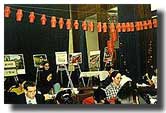 conceived by Yu-Han Chang who discovers a long-ago abandoned event dubbed Winter
Festival, co-sponsored by TCS and the Boston chapter of the North American
Taiwanese Women's Association (NATWA), while going through old budget reports.
The modern-day effort to resurrect the event is spearheaded by Flora Kao and
Yen-Rong Chen, with planning, logistical, and general support staff comprised of
the TCS officer board, various TCS members, and friends and roommates of TCS
officers and members. The inaugural resurrection is a sweeping success with
NATWA mothers cooking the bulk of the 20-course buffet offering, TCSers providing
simpler dishes such as red and green bean soup, almond jello, pearl milk tea,
dumplings, scallion pancakes, and miso soup with tofu and scallions. Booths
include calligraphy writing, Taiwanese hackysack, fragrant sachet (tiang-bao)
making, Shao Lin defense, acupuncture, board games (mahjongg, Chinese chess,
Chinese checkers), Chinese knotting, paper-cutting, mochi making, and shaved ice
making.
conceived by Yu-Han Chang who discovers a long-ago abandoned event dubbed Winter
Festival, co-sponsored by TCS and the Boston chapter of the North American
Taiwanese Women's Association (NATWA), while going through old budget reports.
The modern-day effort to resurrect the event is spearheaded by Flora Kao and
Yen-Rong Chen, with planning, logistical, and general support staff comprised of
the TCS officer board, various TCS members, and friends and roommates of TCS
officers and members. The inaugural resurrection is a sweeping success with
NATWA mothers cooking the bulk of the 20-course buffet offering, TCSers providing
simpler dishes such as red and green bean soup, almond jello, pearl milk tea,
dumplings, scallion pancakes, and miso soup with tofu and scallions. Booths
include calligraphy writing, Taiwanese hackysack, fragrant sachet (tiang-bao)
making, Shao Lin defense, acupuncture, board games (mahjongg, Chinese chess,
Chinese checkers), Chinese knotting, paper-cutting, mochi making, and shaved ice
making.
February 28, 1998: While at the 1998 ITASA Conference hosted by
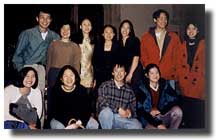 Princeton University's Taiwanese American Students Association, Yu-Han Chang,
Eric Dai, Chienlan Hsu, and Michelle Ko present TCS's bid entitled "Emerging
Faces" to host the 1999 conference which faces competing bids by Carnegie
Mellon's Taiwan Students Association and Yale's Taiwanese American Society,
with Yale ultimately winning the bid. In the unsuccessful bid, TCS was
supported in proposal preparation by James Chang, James Chen, Michelle Chen,
Tina Chen, Yen-Rong Chen, Shelley Day, George Han, Chanda Ho, Grace Hsieh,
Henry Hsieh, Carey Hsu, Tannie Huang, Flora Kao, Charles Lin, Greta Lin, Grace
Liu, Sue-Jean Liu, Angela Wu, Susan Yeh, Jimmy Young, and Elaine Yu. The loss
is pegged primarily on the TCS presentation team's lack of preparation (due to
lack of advance notice) of a full-length presentation outlining their entire
bid that was asked for by the ITASA board, rather than a simple question-and-answer
clarification session that they had been expecting. Besides the aforementioned
presenters, other TCS attendees include Jay Chen, Michelle Chen, Shaw Chen,
Yen-Rong Chen, Eric Dai, Shelley Day, Jeff Gu, Henry Hsieh, Flora Kao, Emily Ko,
Greta Lin, Harrison Lin, Sue-Jean Liu, Bea Shu, Eric Yeh, Susan Yeh, and Jimmy
Young. The conference itself is generally enjoyed by TCSers, featuring among
other things, a keynote performance entitled "Making Tracks" performed by Welly
Yang (then-current ITASA Taiwanese-American of the Month) and his production
company Second Generation (2G) Productions.
Princeton University's Taiwanese American Students Association, Yu-Han Chang,
Eric Dai, Chienlan Hsu, and Michelle Ko present TCS's bid entitled "Emerging
Faces" to host the 1999 conference which faces competing bids by Carnegie
Mellon's Taiwan Students Association and Yale's Taiwanese American Society,
with Yale ultimately winning the bid. In the unsuccessful bid, TCS was
supported in proposal preparation by James Chang, James Chen, Michelle Chen,
Tina Chen, Yen-Rong Chen, Shelley Day, George Han, Chanda Ho, Grace Hsieh,
Henry Hsieh, Carey Hsu, Tannie Huang, Flora Kao, Charles Lin, Greta Lin, Grace
Liu, Sue-Jean Liu, Angela Wu, Susan Yeh, Jimmy Young, and Elaine Yu. The loss
is pegged primarily on the TCS presentation team's lack of preparation (due to
lack of advance notice) of a full-length presentation outlining their entire
bid that was asked for by the ITASA board, rather than a simple question-and-answer
clarification session that they had been expecting. Besides the aforementioned
presenters, other TCS attendees include Jay Chen, Michelle Chen, Shaw Chen,
Yen-Rong Chen, Eric Dai, Shelley Day, Jeff Gu, Henry Hsieh, Flora Kao, Emily Ko,
Greta Lin, Harrison Lin, Sue-Jean Liu, Bea Shu, Eric Yeh, Susan Yeh, and Jimmy
Young. The conference itself is generally enjoyed by TCSers, featuring among
other things, a keynote performance entitled "Making Tracks" performed by Welly
Yang (then-current ITASA Taiwanese-American of the Month) and his production
company Second Generation (2G) Productions.
Friday, March 6, 1998: An editorial by educational and cultural chair George Han appears in the Harvard Crimson, urging readers not to forget the lessons of the 1947 February 28 Incident in Taiwan.
Friday, March 6, 1998: The new TCS officer board holds a retreat held in the Lowell room of co-president Yu-Han Chang and secretary Henry Hsieh.
Saturday, March 7, 1998: TCS follows George Han's 2-28 editorial with a lecture and discussion of the February 28 Incident, held in Sever Hall. The commemoration features Dr. Sidney Chang of Harvard Medical School, who presents a synopsis of the incident to approximately 40 attendees, followed by a few video clips of footage shot in Taiwan during the time period, and then a question and answer session.
Saturday, March 7, 1998: As part of Harvard's Junior Parents Weekend activities, TCS schedules a Junior Parents dinner at Ta Sheng Restaurant for visiting parents of TCSers. It ends up being a small affair, including the families of Michelle Chen and Henry Hsieh as well as TCS sophomores George Han and Lewis Shi.
March 14, 1998: The 1998 Cambridge Cup opens with TCS taking on MIT in volleyball at MIT's DuPont Gym. Unfortunately, captain James Chang is the only TCSer to show up, and is thus forced to forfeit on behalf of Harvard.
April 1, 1998: TCS holds a general meeting to promote and seek help for several of its upcoming events and activities, in particular its "Boston Tea Party" (an intercollegiate karaoke event), hosting the inaugural Boston Intercollegiate Taiwanese Students Association Conference, and its ongoing campaign to get Taiwanese classes taught at Harvard.
 April 3, 1998: TCS hosts an intercollegiate karaoke night and tea
night that it dubs "The Boston Tea Party - Taiwanese Style". The event
features a relatively wide array of perhaps 5 or 6 different types of tea (green,
April 3, 1998: TCS hosts an intercollegiate karaoke night and tea
night that it dubs "The Boston Tea Party - Taiwanese Style". The event
features a relatively wide array of perhaps 5 or 6 different types of tea (green,
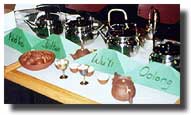 black, red, oolong, wu-yi, and others), but perhaps the most significant and
certainly enduring sign of the event's success is that its publicity poster
somehow manages to find its way into the lecture slides of Harvard music
professor Kay Shelemay who proceeds to use it in her Literature and Arts B-78
course Soundscapes to help illustrate her unit on ethnic music in the Boston
area and show how music from other cultures has infiltrated American communities.
black, red, oolong, wu-yi, and others), but perhaps the most significant and
certainly enduring sign of the event's success is that its publicity poster
somehow manages to find its way into the lecture slides of Harvard music
professor Kay Shelemay who proceeds to use it in her Literature and Arts B-78
course Soundscapes to help illustrate her unit on ethnic music in the Boston
area and show how music from other cultures has infiltrated American communities.
April 4, 1998: The 1998 Cambridge Cup continues with a TCS-ATS basketball game at Harvard's Malkin Athletic Center.
April 4, 1998: TCSers head out into Boston for a friendly game of laser tag with students from MIT and Tufts at Boston's Good Times.
April 4, 1998: TCS puts out the call for applications to staff the inaugural BITSA conference, tentatively scheduled for the upcoming fall at Harvard. Not precisely born out of "spite", as some might and have contended, towards ITASA for rejecting the Harvard bid for the 1999 ITASA conference in favor of Yale, the BITSA conference nonetheless certainly draws upon the program ideas and specific speaker and business connections developed in preparation of Harvard's ITASA '99 proposal.
April 5, 1998: TCS starts a House liaison program, an analog to its big-little sib program, except matching upperclassmen and first-years not by interests, but rather by House, seeking to have current House residents help acquaint rising sophomores just receiving their housing assignments to their new homes.
Thursday, April 9, 1998: Due to Quincy House's semi-annual faculty dinner, TCS moves Taiwanese Table to the Lowell House Small Dining Room. In a semi-successful attempt to attract additional attendees to Taiwanese Table, in addition to providing Taiwanese lessons, TCS also serves chua-bing.
Monday, April 13, 1998: TCS announces the staff for the 1998 BITSA conference. Co-directing are former TCS co-president Chienlan Hsu and former TCS educational & cultural chair Judy Hung. Selected as programming co-chairs are Loretta Kim and Judy Tsai, with TCS public relations chair Tina Chen to serve as business chair and Matthew Feng as operations chair. Rounding out the staff are Carey Hsu and Emily Ko as publicity co-chairs, and Henry Hsieh in a somewhat catch-all role as "extraneous objects chair", or simply "the EOC", a title which will become surprisingly apt, spanning such responsibilities as graphic and web design, publicity strategizing and execution, and knot-tying.
Friday, April 17, 1998: Outgoing and incoming TCS officers get together at Ta Sheng for the annual old-new officers dinner. The event is declared to be a semi-formal affair, with the current officers arranging to have all of the male old officers (who somehow all happen to reside in Quincy House) picked up by the current female officers and all the female old officers (who rather inconveniently for their escorts, happen to each live in three different Houses) picked up by the current male officers.
 Sunday, April 19, 1998: As part of the final component of Cambridge Cup
competition, the TCS ultimate frisbee team led by pseudo-captain Henry Hsieh and
comprised of Yu-Han Chang, Eric Hsu, Kaiwen Kam, Grace Liu, Liam McAllister,
Lewis Shi, Yu Yasufuku, Eric Yeh, and Elaine Yu, takes on the MIT ATS team on
MIT's lush Killian Court. Having lost at both volleyball and basketball, and
thus the overall Cup, TCS is playing for pride only, seeking to prevent an MIT
sweep of the competitions. And defend TCS pride, they certainly did, defeating
MIT by a score of 15-3 even after lending them a few Harvard players as substitutes
when the game started to get out of hand. Highlights of the game included a hammer
throw for a score by Grace Liu, inspired play by Eric Hsu as the #1 in the TCS
1-3-3 zone defensive array, Yu-Han's endzone throw for 1/3 of MIT's total points,
and of course the image all game of TCSers running around in custom-decorated TCS
t-shirts featuring each player's name emblazoned across the back.
Sunday, April 19, 1998: As part of the final component of Cambridge Cup
competition, the TCS ultimate frisbee team led by pseudo-captain Henry Hsieh and
comprised of Yu-Han Chang, Eric Hsu, Kaiwen Kam, Grace Liu, Liam McAllister,
Lewis Shi, Yu Yasufuku, Eric Yeh, and Elaine Yu, takes on the MIT ATS team on
MIT's lush Killian Court. Having lost at both volleyball and basketball, and
thus the overall Cup, TCS is playing for pride only, seeking to prevent an MIT
sweep of the competitions. And defend TCS pride, they certainly did, defeating
MIT by a score of 15-3 even after lending them a few Harvard players as substitutes
when the game started to get out of hand. Highlights of the game included a hammer
throw for a score by Grace Liu, inspired play by Eric Hsu as the #1 in the TCS
1-3-3 zone defensive array, Yu-Han's endzone throw for 1/3 of MIT's total points,
and of course the image all game of TCSers running around in custom-decorated TCS
t-shirts featuring each player's name emblazoned across the back.
Saturday, April 25, 1998: TCS holds a reception during Harvard's Prospective Student Weekend, also known as Pre-Frosh Weekend, to greet potential members of the Harvard Class of 2002. The reception features free chua-bing making and eating, of course as well as a number of current TCS officers and members ready to greet prospective students and answer any questions about TCS or Harvard in general. Later that evening, TCS co-sponsors a pre-frosh dance, titled "Maxim", with the Harvard Chinese Students Association and the Asian American Association held in Eliot House Dining Hall.
April 29, 1998: As part of a Harvard Foundation film festival series, TCS hosts a showing of The Green Snake by Taiwanese director Hsu Ko in the Lowell House Junior Common Room. Other participants in the film festival include the Catholic Students Association, Asian American Association, Harvard African Students Association, Cuban-American Undergraduate Students at Harvard, Irish Cultural Society, Persian Society, and Central and Eastern European Club.
Saturday, May 2, 1998: TCS holds its final brunch run of the year, taking members to Chinatown for dim-sum at China Pearl Restaurant.
Thursday, May 7, 1998: TCS holds its spring senior farewell picnic at JFK Park. The picnic features sandwiches, chips, and soda as usual from Harvard Dining Services, but also as a special treat, mung bean soup, cooked the previous night. Food is eaten, frisbee is played, and seniors are hailed.
 November 1, 1997: Jiang Zemin arrives at Harvard.
November 1, 1997: Jiang Zemin arrives at Harvard.